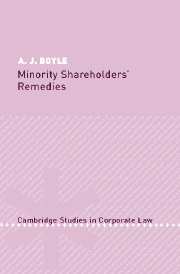3 - A new derivative action
Published online by Cambridge University Press: 11 July 2009
Summary
Introduction
In 1997, the Law Commission completed its task of reviewing and reforming the law on shareholders' remedies. The Law Commission published its Consultation Paper on shareholders' remedies in 1996 and its Report in October 1997. The central feature of the Law Commission's proposals is a ‘new derivative action’. This important proposed change in the law on minority shareholders' remedies is worth detailed attention. The Report contains both draft legislation in the form of a ‘Draft Companies (Members Proceedings) Bill’ with the all-important detailed procedure fleshed out in the ‘Draft Civil Procedure Rules on Derivative Claims’. The Department of Trade and Industry later published its own Consultation Paper on shareholder remedies. This indicates unqualified approval of the Law Commission's proposal for a statutory derivative action in English law. It is therefore not unreasonable to draw the conclusion that, it is hoped before not too long, Parliament may enact the Law Commission's new derivative remedy. Certainly, this would be possible without awaiting further structural reforms of company law.
In both its Consultation Paper and in its Report on shareholder remedies, the Law Commission accepts the failure of the old existing ‘common law’ derivative action. The Commission accepts the general ‘philosophical’ approach of the rule in Foss v. Harbottle in terms of general principles. ‘Our view was that the basic approach to the right to bring a derivative action was a sound one: an individual shareholder should only be able to bring such an action in exceptional circumstances.’
- Type
- Chapter
- Information
- Minority Shareholders' Remedies , pp. 60 - 89Publisher: Cambridge University PressPrint publication year: 2002
- 1
- Cited by

